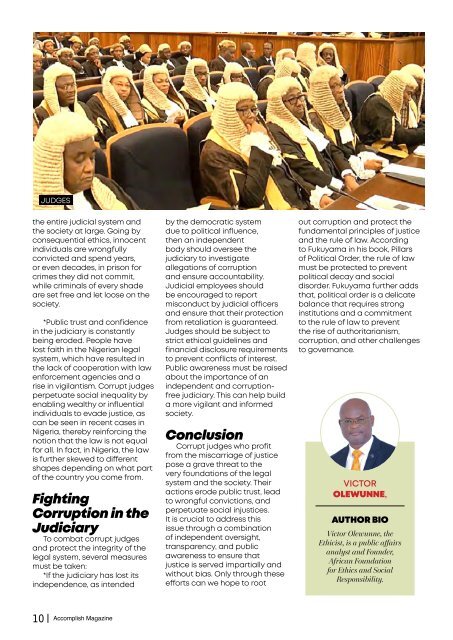ACCOMPLISH MAGAZINE NOV 2023
Mo Ibrahim: On Ethical Leadership In Africa
Mo Ibrahim: On Ethical Leadership In Africa
You also want an ePaper? Increase the reach of your titles
YUMPU automatically turns print PDFs into web optimized ePapers that Google loves.
judges<br />
the entire judicial system and<br />
the society at large. Going by<br />
consequential ethics, innocent<br />
individuals are wrongfully<br />
convicted and spend years,<br />
or even decades, in prison for<br />
crimes they did not commit,<br />
while criminals of every shade<br />
are set free and let loose on the<br />
society.<br />
*Public trust and confidence<br />
in the judiciary is constantly<br />
being eroded. People have<br />
lost faith in the Nigerian legal<br />
system, which have resulted in<br />
the lack of cooperation with law<br />
enforcement agencies and a<br />
rise in vigilantism. Corrupt judges<br />
perpetuate social inequality by<br />
enabling wealthy or influential<br />
individuals to evade justice, as<br />
can be seen in recent cases in<br />
Nigeria, thereby reinforcing the<br />
notion that the law is not equal<br />
for all. In fact, in Nigeria, the law<br />
is further skewed to different<br />
shapes depending on what part<br />
of the country you come from.<br />
Fighting<br />
Corruption in the<br />
Judiciary<br />
To combat corrupt judges<br />
and protect the integrity of the<br />
legal system, several measures<br />
must be taken:<br />
*If the judiciary has lost its<br />
independence, as intended<br />
by the democratic system<br />
due to political influence,<br />
then an independent<br />
body should oversee the<br />
judiciary to investigate<br />
allegations of corruption<br />
and ensure accountability.<br />
Judicial employees should<br />
be encouraged to report<br />
misconduct by judicial officers<br />
and ensure that their protection<br />
from retaliation is guaranteed.<br />
Judges should be subject to<br />
strict ethical guidelines and<br />
financial disclosure requirements<br />
to prevent conflicts of interest.<br />
Public awareness must be raised<br />
about the importance of an<br />
independent and corruptionfree<br />
judiciary. This can help build<br />
a more vigilant and informed<br />
society.<br />
Conclusion<br />
Corrupt judges who profit<br />
from the miscarriage of justice<br />
pose a grave threat to the<br />
very foundations of the legal<br />
system and the society. Their<br />
actions erode public trust, lead<br />
to wrongful convictions, and<br />
perpetuate social injustices.<br />
It is crucial to address this<br />
issue through a combination<br />
of independent oversight,<br />
transparency, and public<br />
awareness to ensure that<br />
justice is served impartially and<br />
without bias. Only through these<br />
efforts can we hope to root<br />
out corruption and protect the<br />
fundamental principles of justice<br />
and the rule of law. According<br />
to Fukuyama in his book, Pillars<br />
of Political Order, the rule of law<br />
must be protected to prevent<br />
political decay and social<br />
disorder. Fukuyama further adds<br />
that, political order is a delicate<br />
balance that requires strong<br />
institutions and a commitment<br />
to the rule of law to prevent<br />
the rise of authoritarianism,<br />
corruption, and other challenges<br />
to governance.<br />
Victor<br />
Olewunne,<br />
AUTHOR BIO<br />
Victor Olewunne, the<br />
Ethicist, is a public affairs<br />
analyst and Founder,<br />
African Foundation<br />
for Ethics and Social<br />
Responsibility.<br />
10<br />
Accomplish Magazine

















